- Home
- Cecil Beaton
The Parting Years (1963-74) Page 2
The Parting Years (1963-74) Read online
Page 2
Motoring along the lake to their Burgenstock chalet in the mountains on the other side of the lake, I had a glimpse of the country that I love: woods and orchards, and cottages with gardens. We came to a strange group of Edwardian hotels owned by Audrey and Mel’s landlord and, it now being out of season, they had a strange Thomas Mann, deserted quality; but not so my friends’ little wooden chalet. This was brimming over with the delightful, smiling Italian and Swiss servants who had tended Audrey and Mel so well in Hollywood; and here was Sean, their son, redcheeked and thrilled, shouting a welcome.
To step inside this Swiss doll’s house was to realize what I had missed in St Moritz. Everything was white, and of a clean simplicity; white cotton covers on chairs, long white net curtains and white Swiss linen everywhere; huge bouquets of white tulips or yellow flowers to complement the orange and yellow sofas; an incredible impeccability — in the modern white china, the embroidered napkin wrapping the brown-bread toast, the array of books, the Picasso drawing, the Modigliani figure, the Matisse head. The bedrooms with their covers and huge pillows were of a mountain-water cleanliness. This was something more nourishing that a good steak, for it was food for the spirit.
Audrey is a natural. She has taken up her role in life with a complete ease that is rare. She is strong and firm in character, and seems to be never swayed to do the foolish or unkind thing. Her relationship with Mel is not all that easy, but she loves him. Audrey takes the rough with the smooth and there is a great deal of the smooth. Her success is astonishing and not only financially. Yet she never allows herself to regard it except as her professional career; it comes second to her private life.
Audrey is very proud of her home and everything in it. The evening meal is the great food event of the day. Audrey takes pains over the artichokes, Roman-style (basted in butter and parsley), the beef with carrots, the Swiss pâtisseries. The infinite trouble and the finesse she manages strike me as being extraordinary.
New York: March
Halfway across the Atlantic, Pelham Place had receded into the distance and the readjustment to New York had started.
The arrival had its own character. A man from the Metropolitan Opera House met me with a car, and gave me good news of the production of La Traviata that I was to work on. Messages had been left for me at the hotel, and before I had unpacked an excited Alfred Lunt was on the line. Could we go immediately to the opera house? Before many minutes in the company of Krawitz, Wrong and Bing, my colleagues in this venture, I began to feel I had always been there. The old problems arose; not much money; little rehearsal time; and too many productions in too short a time. But
Alfred, smelling of beer, said his piece, and apologized for talking too much. He is sweet and understanding and a good man, and I pray to God that I will always love him. Alfred took me home in the afternoon but I was too keyed up and exhausted to sleep. At eight o’clock I went to the dinner he and Lynn were giving for me. Truman was there, the Joe Alsops, Madeleine Sherwood and others, and soon I was involved in local gossip.
Truman came back with me to the hotel. We talked over whiskies and sodas until I realized that by English time it was 7.30 in the morning.
When I woke I spoke for one hour on the telephone to Diana Vreeland. She inspired me, and gave me impetus to carry me through my non-stop day. Diana has learnt not to be pressurized. She’s never in a hurry, though she knows there are dozens of people waiting for her to hang up the receiver.
Lunch at the Met., followed by Zefferelli’s Falstaff, then, in the evening, Dolly with Margaret Case. To end the day, a snowstorm. It gave us such a surprise when we came out of the theatre and prevented our finding a cab. So we had to trudge through the tornado and were soaked through by the time we got back to the hotel.
Stratford: April
To Stratford to see the exhibition celebrating the quatercentenary of Shakespeare’s birth. This proved to be Dickie Buckle’s triumph! Absolutely thrilling, mysterious, surprising, shocking, full of contrasts; and, above all, imaginative. Pop art and Nicholas Hilliard, rare Elizabethan revelry and modern junk; music, sonnets, and scent coming out of the ethos to greet one. The Elizabethan London of Timothy O’Brien evoked in terms of today; Elizabeth being cheered as she passed in her chair the burnt corpses of the plague; among the squalor, a huge hunk of bleeding meat hanging in mid-air. Alan Tagg’s work was subtle and sensitive; a long gallery of authentic Elizabethan portraits and a clever, fascinating model of the Globe Theatre. The Jean Hugo murals were old fashioned but, I suppose, a good contrast.
At the theatre there was a marvellous production of Richard II. All the actors in this company have a mastery of style, a reverence for the poetry and none of the ranting of the old ham. David Warner’s interesting portrayal of Richard II was off-hand, and his obsequious attitude utterly contemporary. I felt Stratford as alive as in Shakespeare’s day, and the spirit of the bard strongly in my bones.
The first photographs of Prince Edward: May
From the moment the group assembled themselves in the white oasis in front of the camera, the pattern seemed to form and the lighting proved as luminous as we had hoped. Moreover, the infant showed bonhomie and an interest in the activity that was going on. His behaviour pleased and amused the Queen, who was in a happy, contented and calm mood, and smilingly obeyed my instructions.
Prince Andrew was determined to be in every picture, and behaved like a professional, adding the charm of the too-young-to-know-really-what-it-is-all-about.
I found myself rushing up and down a step-ladder with the celerity of a mountain goat. The Queen remarked on the speed with which I cranked the camera: ‘He’s much quicker than I am!’ I noted that sweat was running down my torso. But such effort was justified. Sometimes I click with desperate speed, hoping that some fluke will evolve. This time I felt that good results were being got immediately. The Queen’s wide grin dominated the picture, and other felicitous elements were provided by Andrew’s blue, wistful, little-boy eyes and those of the infant who was alert, curious, and already a character.
The day was dark and grey, with lowering clouds, but there was enough light and we moved to take pictures around the crib in which the Queen, Princess Margaret and all her children had lain. Thence to the blue porphyry columns, and to the blue brocaded drawing-room next door. These pictures were more banal, but I was elated at having chosen white-paper backgrounds, as the gilt and heavy marble columns, though impressive to the eye, have been overdone and appear fussy and old-fashioned.
Andrew, the dominant figure, remained cheerful, the baby continued to hold its own, and each time I asked the Queen if she had had enough, she was just willing to continue a little longer. ‘Look his eyelashes are all tangled!’ she said, admiring the latest addition to the family. ‘It’s most unfortunate that all my sons have such long eyelashes while my daughter hasn’t any at all.’
May
I seldom notice the presence of Mrs Cartwright, who has been a faithful member of the Pelham Place entourage for many years now. She is quiet and tactful, and although I try to treat her as a human-being I am generally so absorbed in writing a letter or choosing the best poses out of a hundred negatives while she is tidying the room, that there is seldom more than a cursory exchange of politenesses. Mrs Cartwright is rather shy and tentative. Only once did she overcome her reserve: she tried to comfort me when I was sitting at my desk convulsed with tears at hearing the news that Peter Watson had been drowned.
I have heard, through Eileen,[2] that Mrs Cartwright has strong dislikes. At one time she got on extremely badly with Cornelius, the cook; although she has a bawdy sense of humour she can be easily shocked, as when she saw a set of nude photographs I’d taken and covered them up as they lay on my desk.
Eileen, arriving in my bedroom at the start of another busy day, is always treated to a short account of the previous evening’s happenings before the telephone interrupts us, and the awful, harrowing, unnerving rush to get to my first appointment starts.
My dinner party had portended well. I had brought up from the country, with great care, three beautiful bottles of rare claret — Rothschild 1928 and 1921. These were for the benefit of Cyril Connolly who was coming to London in order to have dinner with me. I had invited Cyril and his wife, Deirdre, Bertie and Jane Abdy, and Martita Hunt. But I had to confess to Eileen that although the intentions of the guests were friendly, the atmosphere had been indefinably spiky. I did not quite know why, but neither the Connollys nor the Abdys seemed to be playing on my side. Maybe it was my imagination, but Cyril seemed aggressive; perhaps it was his way of trying to cover up the lateness of their arrival. No sooner had he appeared than he was baiting Bertie, who was fatuously ‘poohpoohing’ Cézanne and saying his importance was only fabricated by women and dealers; Bertie’s theories about nobody caring about art, only about the money that art can provide, become more ridiculous.
Bertie then said to me: ‘May I be perfectly frank? I don’t think you should have these rugs on this lovely floor. You should get rid of them.’
Talk had been so intelligent that later Martita told me she had not felt equal to joining in. However, she did hold forth later on as a connoisseur of food, and where to get the best in London. This she did with consummate style and she displayed her flair and taste in the way that justified her presence.
A day later Eileen arrived in the country. As we sat in the drawing-room after dinner, she said: ‘You know, you were right about what you said about your dinner party not being quite easy. Mrs Cartwright had noticed it, and told me all about it. She said that she sensed it from the moment the Abdys arrived and Sir Robert asked her, it being quite a lovely summer evening, “Are we dining in the garden?”’ Upon entering the drawing-room he had asked me the same question in a rather bullying tone. I could not remember my reply, but Mrs Cartwright had and had thought it was rather good: ‘No, and I’m afraid it’s too late to get a nightingale from Berkeley Square.’
Unaware to me, Mrs Cartwright had gone back to Streatham with her head full of interesting impressions of an evening that I knew was not at all cosy, yet which, but for her, would soon have been forgotten.
A TOUR OF ENGLAND
June 1964
I was glad England had played up and presented a high-summer evening of perfect beauty. The roses were billowing in every Great Western Road villa garden. Kin’s[3] reactions, as usual, were very much to the point. I could hardly imagine that the plans had worked so well — touch wood. We motored to Pelham, talking hard — so much to laugh about. First he must see his room. Was the bed too small? His legs hung way out over the end. But perhaps we could arrange something else. ‘Have you had dinner?’ ‘Yes, but you know me.’ He ate a second one, and then in the twilight we drove through London to the City to see St Paul’s, the Monument, Wren churches; then through Covent Garden and the Strand, St James’s Park, the Mall, past St James’s Palace. I talked continuously and Kin was asleep. (He had not slept for two nights.) Then, back home, he slept the sleep of the dead. This difficult, strangely untrained, yet high-quality American had seen fit to give himself into my trust, and accept my offer to make a new life for him over here.
In the glorious sun of Tuesday we set out in the car for Land’s End, the first leg of a voyage to see my own country, a journey that was to take us all over the kingdom. The West was beautiful in spite of the first rush of holidaymakers, and ‘Bed and Breakfast’ signs were everywhere.
Exeter Cathedral, more squat than Salisbury, but original and successful, with a frieze of carvings on the façade. No room at the first inn; a hideous dinner at a restaurant; the night spent at a soulless motel. But what does it matter if our spirits are high and our affections involved.
Land’s End, its rugged, clean, primeval beauty unsullied by the press of trippers; St Michael’s Mount; the Headland Hotel at Newquay, a red brick Victorian monstrosity gloriously perched above ocean and rock. A trio played excruciatingly during dinner; typically bad English fare with mayonnaise out of a bottle.
Early dawn departure; enough of Cornwall. The huge hedges prevent one seeing the glorious views except when going down steep hills. (Thank heavens for our well-cut hedgerows in Wiltshire.) After the winding roads of Cornwall we found it was possible to make good time. We went back through Exeter, and then on to Glastonbury Abbey. Kin liked this very much. He leapt about, taking many photographs with real enthusiasm. The monk’s kitchen, a tall white circular room, was, he said, the sort of room he would like to live in.
The high-summer weather had gone as suddenly as it arrived, and now all was cold and grey. Wells Cathedral did not look its best. It has a certain character but is not really impressive as a creative expression of devotion.
Saturday, July 11th
We went to Coventry to see the cathedral there. On second sight it is more impressive, especially now that the crowds have diminished. Piper’s and other stained-glass windows theatrical, and the modern architecture of ‘explosive forms’ interesting, as are the modern cross and sculptures in side chapels. Very moving the remains of the bombed cathedral with the burnt-out cross on the altar and the words — ‘Forgive them for what they did ...’ or some such inscription. The tapestry designed by Graham Sutherland is a miracle of the weaver’s art.
Then to Derby, and soon signposts to Kedleston. It was not open to the public but I bluffed lodgekeepers and drove into a glorious park with a lake and up to the bolted front door. In the church nearby a hilarious marble monument of Lord Curzon and his first wife lying side by side. She was the Chicago heiress whose mother said at the time of the engagement: ‘Mr Leiter has been so generous to Mary, he’s given her bête noire for her trousseau.’
Miles covered early — too soon to arrive at Chatsworth, so first to Haddon Hall. In the chapel, which has beautiful frescoes in black and white linear designs, is Violet, Duchess of Rutland’s effigy of her nine-year-old son — a triumph for someone who had previously done no sculpture — a tour de force of emotion. Kin deeply roused by beauty of long room, the terraces with buttresses from which trees grew, the rivers and streams gushing, the herds wallowing in daisies; the Elizabethan rose-gardens, and the kitchens, where Kin’s imagination worked overtime conjuring up the rush and bustle of dozens of cooks preparing enormous meals; the brown and oatmeal-coloured wood worn by use and polished like glass.
Thence to Chatsworth. In Debo’s absence, Emma and her new husband[4] were hosts, and very accommodating and interesting on their own.
Kin overjoyed and laughing at the grandeur of Chatsworth bedroom — the windows soaring for ever — my bed with gilded dome reminded him, with its ruched silk, of a funeral casket.
Emma told us that the government had taken seven priceless works of art from the collection at Chatsworth to pay for death duties; an early Greek head, a missal of infinite value, a Holbein cartoon of Henry VIII, rare books, and, she added, ‘then they took Hardwick’. We visited Hardwick the next day, a house built by the energetic Bess who hankered for light, hence windows everywhere, miles of them; a wonderful gallery; wide staircases and landings; needlework and heraldic animals.
Sightseeing by the mile at Chatsworth: signs of untold wealth even after the government did pick the cherries. Details strike a note of luxury — the window panes of bevelled glass, windows lined with gold; masterpieces of painting tucked in a corner. Halcyon weather; idyllic parkland and situation. Telescopic lens of camera trained on distances and Japanesey bridges, spires of model village church, a Greek statue rose-clung.
Through the fumes of surrounding smoking mines, we visited Sutton Scarsdale, a sad ruin, bought hopelessly by Osbert Sitwell; nothing can be done with it now; too expensive to build and no land; not even romantic. On to Bolsover, a marvellous ruin, with square patches of sunlight on clipped lawns through empty windows. Impressive dormer-window embellishments.
Leeds, Sheffield, the smoking chimneys, wires, derricks, cranes. The clustered villages on slopes of moors, the drab symmetry of s
lum roads, dark brick walls, mauve-painted doors. The young men of the towns are ‘beat’ in appearance. The population doomed to live here and not liking it any more than I do. Kin understands them. They like the cinema and know it is an expression of art, an artificial form. They like their families, music; they read, they have immortal longings.
The soot gave way to moors, with bracken and huge oak forests and we were in the West Riding.
For our first glimpse of it the Lake District — Ullswater, Windermere — was at its most calendar-art picturesque, but this did not detract in any way from beauty on such a scale. Gentian and periwinkle mountains, new-lettuce-green trees, waterfalls, glassy smooth lakes; pine trees, sheep, bracken. The air so clear.
We photographed, we walked, we watched sheep shearing, we thrust our noses into hay-barns and were euphoric about the smells. Goats and sheep were bleating, turkeys gobbling, doves cooing.
Stopping to telephone our progress to the Sekers’ household, the 1850 hotel struck one as being so much cleaner than elsewhere.
A warm welcome from Miki Sekers, dressed like an old-fashioned circus proprietor off duty, in jersey, Ascot stock and loose trousers — Hungarian high spirits and hospitality. Open house. Nice intelligent son David and young men from the mill. Paprika chicken. Dom Perignon champagne. Luxury — success — money easy — laughter easy — friendship easy. Late-Georgian house decorated as if by Gladys Calthrop for the latest Noël Coward drawing-room comedy — a Monet, Bonnards, Sutherlands, mixed with Victorian junk. No restraint here.
The glorious weather had given place to rain, but perhaps it was right that we should see this district at its most typical. Miki, early in my room, provided a type-written itinerary with suggestions for our day’s jaunt to Cockermouth, Keswick, Penrith, Appleby and Temple Sowerby.

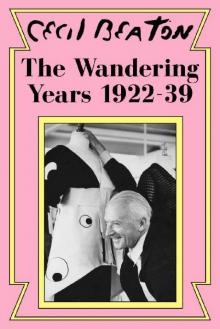 The Wandering Years (1922-39)
The Wandering Years (1922-39)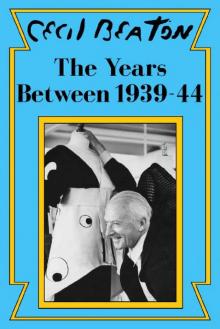 The Years Between (1939-44)
The Years Between (1939-44)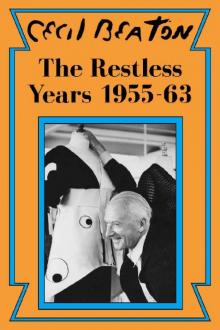 The Restless Years (1955-63)
The Restless Years (1955-63)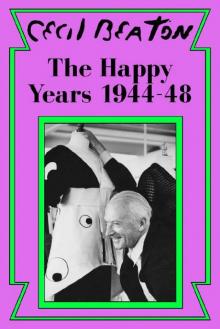 The Happy Years (1944-48)
The Happy Years (1944-48)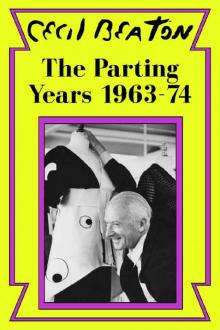 The Parting Years (1963-74)
The Parting Years (1963-74)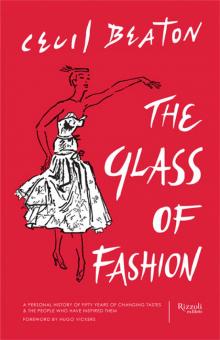 The Glass of Fashion
The Glass of Fashion